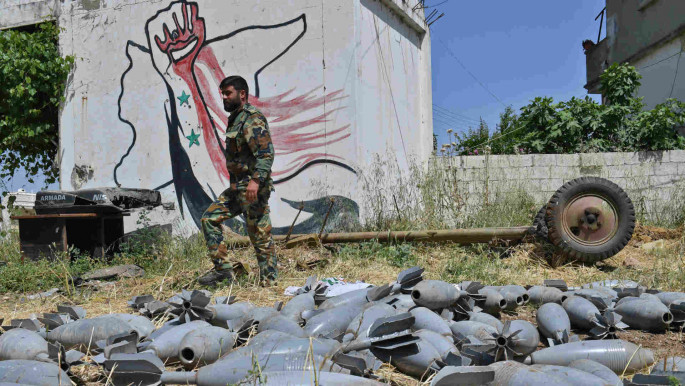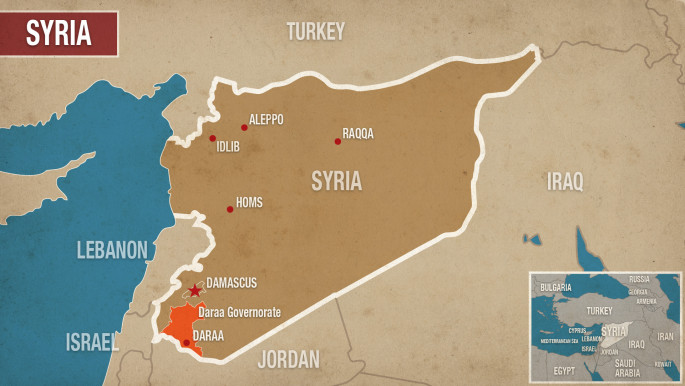Daraa: Life under Syrian regime rule in the revolution's birthplace
More than eight years later, after the Assad regime waged a brutal war to bring the province back under its control, supported by Russia and Iran, anti-regime messages are once again appearing in the province.
"The revolution that gave birth to Sarout will not die", graffiti read in the town of Karak, in reference to revolutionary icon Abdel Baset Sarout who was killed in Idlib this month.
"The entry of the regime is not the end but the beginning…the murderers of children will fall."
Last week, protests were held in the town of Daraa outside Omari Mosque, where some of the first demonstrations of the revolution were held. As arrests, assassinations and protests continue, perhaps Daraa points to the inability for the regime to fully be able to reclaim control over Syrian provinces which were at the heart of the revolution?
Twitter Post
|
Beirut-based analyst Munqeth Agha said that the 'unfulfilling' nature of the terms of the Russia-brokered reconciliation which brought a truce between opposition groups and the regime last year is part of what is fuelling local grievances, as residents of the province struggle under poor economic conditions and a lack of services.
"Secondly, the internal division of the different regime security and military units... constantly weakens the security grip of the regime in the area, and consequently, offers more space for instability incidents to appear," Agha said.
Activists report the situation is far from stable, despite the agreement, which expired this week, but has been extended for one week.
"There is no shelling and no clashes, but the arrests continue, the raids continue, the forced recruitment into the regime's army continue and civilian houses are seized by the army. There is also the assassination of many (opposition figures) and the difficult living situation. Meanwhile, Iranian militias in the south recruit young people who are tempted by money and power into their ranks," said Abu Mohammed, a former opposition activist in the province.
"Arrests are carried out on people who are wanted by the regime and who participated in the revolution. Arrests are made at checkpoints or in regime-controlled areas, or raids carried out by militias loyal to the regime".
"There are some areas where the free Syrian army was independent and didn't enter into agreements with the regime – areas such as Daraa have not been entered into by regime forces."
The protests in Daraa follow a wave of assassinations in the province against both regime figures and those who remained in the FSA. Among the ex rebel commanders killed was Khaled Abu Rukba who was shot dead by unknown assailants as he left his house in Daraa earlier this month, as reported by The New Arab.
Abu Rukba was a leader of the "Free People of Nawa Group" and had reconciled with the regime in 2018 under the reconciliation agreement. Another former rebel, Mohammed al-Badran, was also shot dead by unknown assailants in the town of Tafas. He had recently joined the regime army's "Fourth Division". Several similar incidents took place last May when four former rebel commanders were killed.
"The assassination operations that take place in Daraa is because of the Russian-Iranian conflict on influence in Daraa and each party has factions that follow them and vie with each other to impose control over the region," said Abu Mohammed, while Agha thought there is likely to be a variety of causes behind the assassinations.
"We cannot provide one reason that is standing behind the recent assassinations of former opposition leaders in Daraa especially that it is less likely that they have been carried out by a one single actor as well," said Agha.
 |
|
| Read also: Syria Weekly: Will China fund post-war reconstruction? |
"Rather, a combination of factors that include firstly, the rivalry between the regime-affiliated military and security branches that are linked to different international actors, such as Russia and Iran. Such actors are seeking to build influence among reconciliation factions and recruit former opposition leaders, at the same time target other leaders who are affiliated with their rivals.
"Secondly, arbitrary conscription and detention has been a major source of local discontent amongst Daraa's population and this has provoked a number of opposition leaders to engage in a hostile relationship with the Syrian regime security and military units. This would likely make them an overt target for assassination by the Syrian regime in order to eradicate any organised leadership.
"Third, many reconciled armed opposition commanders and combatants have significant unresolved grievances against other leaders."
The UN human rights office has condemned rights abuses in the province that continue, despite the reconciliation agreement, with at least 380 people arrested or detained by the regime.
"The UN Human Rights Office has received a number of worrying reports of human rights violations and offenses by state and non-state actors, including executions, arbitrary detentions, enforced disappearances, looting and seizure of property. Access to adequate housing, water, education and other basic needs also remains difficult for many,” spokeswoman Marta Hurtado said.
Meanwhile activist Mohammed Hourani told al-Araby al-Jadeed correspondant Ahmed Ibrahim that "the regime's siege on the people of Daraa is not limited to only arrests and security crackdowns, but enforcing collective punishment on them for their uprising in 2011."
 |
|
He cited the high prices of food as making life impossible for struggling residents.
"You see long queues in front of bakeries, fuel stations, and many traders can not leave the province because there are warrants brought against them by the regime. The current situation is intolerable but everyone is afraid."
 |
You see long queues in front of bakeries, fuel stations, and many traders can not leave the province because there are warrants brought against them by the regime. The current situation is intolerable but everyone is afraid |  |
Furthermore local residents worry that the regime will implement further restrictions after the expiry of the agreements brokered by Russia a year ago, with some fearing an imminent escalation in Daraa after regime forces erected barriers around the area still held by independent FSA forces, a cause of the recent protests.
"The future for Daraa is continued conflict, arrests, assassinations, kidnapping and instability. Things can stabilise if Iranian militias leave the region, but their positions have now extended to areas adjacent to the occupied Golan," said Abu Mohammed.
Agha said that if the ceasefire agreement is not renewed again after a week, this will likely further deteriorate conditions in the province, although he feels an open and unified insurgence against the regime is unlikely.
"Deterioration could take the shape of intensified security incidents that would include checkpoints targeting and assassinations, in addition to local protests," he said.
"The rise of the anti-regime rhetoric again in Daraa due to the ongoing regime-led offensive in northwestern Syria that lead to the refusal of some conscripts from Daraa to participate in the military campaign," he said, adding that more conscript refusals are likely in the near future.
"These factors would put more pressure on Russia and the regime to extend the grace period [reconciliation] again."



